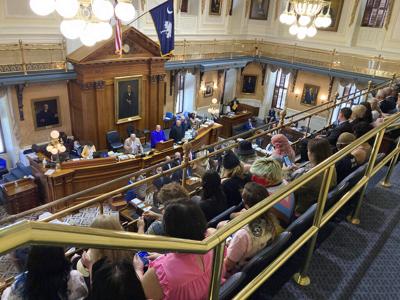The Medical University of South Carolina's health system is no longer providing hormonal treatments for transgender children, the public hospital said in response to a group of conservative state legislators questioning a tweet that brought national scrutiny to its pediatric services.
The confirmation comes two months after the South Carolina Freedom Caucus filed a public records request and six months after the Legislature banned MUSC from using state tax dollars to provide gender transitioning services to children under 16, whether by surgery or hormones.
"Please allow this letter to confirm that MUSC Health does not have a dedicated pediatric/adolescent transgender endocrine clinic and no longer provides pediatric/adolescent transgender hormonal care," reads the letter sent to the caucus last week from MUSC's lawyer, Annette Drachman.
"Further, MUSC Health does not actively offer surgery for the intent of altering gender in any age population," she said.
The MUSC Health Pediatric Endocrinology Clinic saw 120 transgender children in 2021, the health system said Dec. 19 in a statement.
The South Carolina Freedom Caucus called MUSC's response a huge win for both "childhood innocence" and the group, a self-described hardline conservative faction of the state House's GOP supermajority.
"No state dollars should go toward ‘treatment’ that provides irreparable harm and lasting impact on children as young as 4," said state Rep. R.J. May, R-Lexington, vice chair and founder of the caucus. "In the state of South Carolina, you can’t get a tattoo until you’re 18 but we’ll facilitate transitioning children as young as 4?”
The group sent MUSC a public records request in October after a Washington-based anti-President Joe Biden group tweeted that MUSC Health was providing “gender affirming therapy to transgender youth” as young as 4 years old.
The tweet from the American Accountability Foundation cited and linked to a 2021 program on research at MUSC.
The questioned study was a student research paper looking back at the clinic's patient population for a decade through 2020, which grew from one child to 102 in 10 years. The section highlighted in the tweet said MUSC's pediatric clinic had seen patients from ages 4 to 18, who averaged 13.6 years old on their first visit.
According to the research synopsis, 20 percent of them received puberty suppression hormones, 50 percent received hormones to align with the gender they identified with, and 38 percent received no medications.
In its Dec. 19 statement, MUSC said no 4-year-old received hormonal therapy as it is "not appropriate medical practice in pediatric endocrinology," whose guidelines say that treatment should not be given before puberty.
MUSC says it is complying with a ban in the state budget for the fiscal year that started July 1, which applies only to MUSC.
It was inserted in the budget in April after state Sen. Josh Kimbrell, a Spartanburg County Republican, pointed to an MUSC webpage that listed pediatric transgender health among its services for children. Amid the debate, MUSC sent senators a letter saying the hospital does not provide gender reassignment surgery for children but rather a variety of care that includes mental health.
Democrats fought back, accusing Republicans of trying to ban life-saving care, and the clause was amended to specify it did not affect counseling services.
Kimbrell questioned whether MUSC was providing gender-altering hormones to children, saying, “You’re telling me they expressly say what they don’t do. But they don’t clarify what they do.”
May said MUSC's response to the public records request settles that question.
“They were providing puberty blockers and hormone therapy to transition girls into boys and boys into girls. It’s not disputable at this point,” he said. “That MUSC, in South Carolina, a red state, would be facilitating this abomination, for most people it would be surprising.”
His Freedom Caucus has pre-filed legislation for the session starting Jan. 10 that would expand on the budget clause and make it illegal for anyone in South Carolina to perform gender-altering surgery or provide puberty-blocking medication to anyone under 18. It is similar to legislation sponsored in 2021 by Williamsburg County Democrat Cezar McKnight, who was ousted in the June primaries.
That bill, which Republicans including May signed on to, saw no movement at all, partly because it was sent to the Legislature’s only Democrat-led committee. But it could pick up steam in the coming session, when all committees will be controlled by Republicans.
Another letter to MUSC leaders, signed “your pediatric residents,” fought back against “child abuse” claims made by 1st Congressional District Republican U.S. Rep. Nancy Mace in her re-election fight against Democrat Annie Andrews, a pediatrician with MUSC.
In a video posted to Twitter and Facebook, Mace’s campaign accused Andrews of supporting double-mastectomies, castration and hormone-blockers for transgender children younger than 18, calling that child abuse. Mace cited Andrews' opposition to Rep. McKnight's bill in making the accusation, but Andrews said she doesn't support surgery for minors.
The letter said Mace's claim is a lie that is damaging to pediatricians in training.
“Pubertal suppression should be available to developmentally appropriate adolescents during puberty who experience gender dysphoria to allow individuals and their failures (sic) to explore gender identity,” it reads. “This is not provided to prepubertal children as young as four years of age as Rep. Nancy Mace states and it is medically reversible and safe. … Do not shy away from the fight of providing evidence-based care, and do not cower to political attacks.”
May, the father of a 4-year-old son and 5-month-old daughter, said it’s impossible to know the long-term effects of new treatments.
“Having children and knowing what children are like, I don’t know how we can with a straight face say a 4-, 5- or 6-year-old who can’t make their mind up on anything can somehow make a permanent, life-altering choice to take this medication to make them infertile or whatever it may be,” he said. “It goes beyond the pale. For any parent who thinks it’s a good idea, I feel sorry for their children.”











